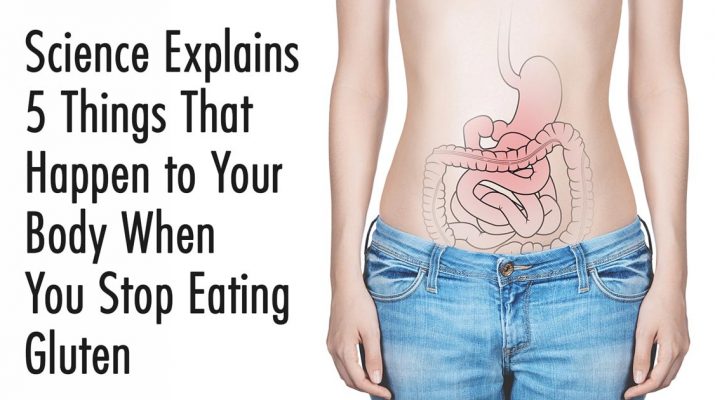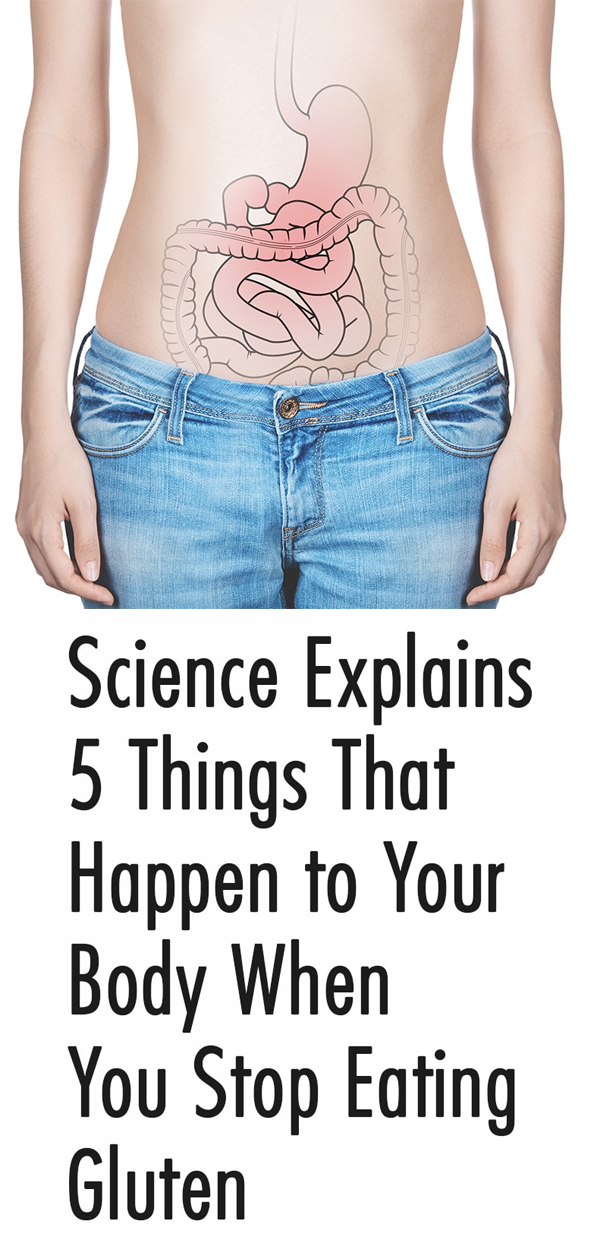Diets free from gluten are far from new in the health world. But in recent years, more and more people are deciding to go gluten-free. In fact, by the year 2020, the market for gluten-free foods is projected to be worth a whopping $7.59 billion.
As of the beginning of 2018, 15% of all households in America were actively avoiding gluten consumption. If you’re thinking of joining in, you need to be aware of how this diet affects the body.
Starting a diet free from gluten is not quite like other popular diets. It can have diverse effects on one’s system: both positive and negative. Depending on how your body reacts, you will then be able to decide whether such a diet is a good option for you.
Fortunately, science explains some things that happen to your body when you stop eating this product. So, if you’re planning on attempting a gluten-free meal plan, the following are some things you should be prepared for. Knowledge about these effects may help you prepare for any potential side effects.
5 Things That Happen To Your Body When You Stop Eating Gluten
“Everyone should try no gluten for a week! The change in your skin, physical and mental health is amazing. You won’t go back!” – Miley Cyrus
1. You’ll Receive Different Nutrients
When you change up your diet, it makes sense that your levels of nutrient consumption will change. If you have only heard good things about gluten-free diets, you might be surprised to learn that this change in nutrients is not all good.
As an example, many studies have suggested that cutting out gluten from your diet can deprive you of valuable nutrients. This is because a lot of products that have wheat in them contain iron and B vitamins. Just removing cereal, pasta, and even typical sandwich bread from your diet can greatly alter the number of vitamins and minerals you get.
Research done in Canada has also shown that depriving yourself of these foods also means you may get less protein. Though this was geared mainly towards children’s foods, other research has suggested adult food is similarly affected. This is because studies have found that gluten-free products contain noticeably lower amounts of protein than other types of foods.
Other studies, though, conflict with these findings. Some research shows that those who go gluten-free actually consume more nutrients and are, overall, healthier in this respect! Here’s a list of some of the nutrients gluten-free dieters receive more of:
- Calcium
- Zinc
- Phosphate
- Folate
- Magnesium
- Viber
- Vitamin C
- B Vitamins
There’s just one catch: these studies that showed positive results were performed on people with Celiac disease. This means that if your body is not allergic to gluten, these studies probably will not apply to you.
Does this mean that going gluten-free is automatically terrible unless you have Celiac disease? Of course not! What it does mean is that you’ll need to make up for the nutrients you’re losing. Here are some examples of what you can eat:
- Cottage cheese (for calcium)
- Legumes (for B vitamins)
- Turkey (for iron)
- Plenty of vegetables and fruits (for assorted vitamins)
Taking supplements, construction special meal plans, and speaking to a nutritionist can also help in this effort.
2. Your Gut And Digestion Will Change
The science behind what happens to the digestive system when you cut out gluten is somewhat iffy. Some say you’ll enjoy positive effects. Others say the opposite. To better understand this, let’s break down the reasoning behind each idea.
Some individuals report markedly improved digestive function after avoiding this product. These people report fewer experiences of:
- Diarrhea
- Bloating
- Constipation
- Abdominal pain
Unfortunately, many of the people involved in studies with these results do have a mild gluten sensitivity, even if they do not have full-blown Celiac disease. As such, this result is somewhat inconclusive for society at large.
That said, there is a good amount of science backing this report of improved digestion. Carbohydrates, especially the whole grains avoided by those who eat gluten-free, are considered the most difficult types of food to digest. This might be why many people enjoy better stomach and gut health when eliminating gluten.
Now, let’s look at why some say the results are not as positive. Foods free from gluten do not have nearly as much fiber as those that have gluten. And since over 90% of people in the US do not eat sufficient fiber as is, this can be pretty dangerous.
A lack of fiber can prevent your body from successfully digesting food according to registered dietitian Tamara Duker Freuman, MS, RD, CDN. Fiber also helps feces bulk up enough to be passed easily. This is why lacking in fiber can cause constipation. So if you go gluten-free and fail to consume enough fiber, your gut will suffer.
The good news about this is that all you need to do to avoid bad gut health, as a result, is to consume more fiber. Here are some options you have:
- Potato skins
- Legumes and beans
- Coconut
- Artichokes
- Leafy greens
- Broccoli
- Corn
- Sweet potatoes
- Yam
- Wild rice
- Brown rice
- Other fruits and vegetables
Fiber is crucial to most gut processes. Don’t leave it out of your meal plan!
3. Your Heart Health May Suffer, If You’re Not Careful
Whole grains provide plenty of benefits to the heart, so it’s fairly obvious what happens when you no longer eat them. Those who do not have Celiac disease and opt out of eating gluten could actually be at a much higher risk of developing cardiovascular diseases. A study released in 2017 in the British Medical Journal proved this fact.
Those who don’t eat gluten may have a harder time incorporating whole grains into their diet. Research has proven that eating a sufficient amount of these foods leads to a 28% lower mortality rate when it comes to cardiovascular diseases. This means that restricting these components isn’t a great idea at all.
There are, thankfully, ways you can combat the heart health that whole grains provide. In fact, there are gluten-free whole grain options. These include:
- Rice
- Quinoa
- Millet
- Oats
- Corn
- Amaranth
You’ll also want to be aware of your blood sugar levels. We all know that reducing carbs – which you will be doing if you’re gluten-free – will cause your blood sugar levels to drop and stay balanced. But if you end up replacing your carbs incorrectly, you could actually do even more harm. A lot of gluten-free versions of food are harmful to glucose levels. These include:
- Pasta
- Biscuits and crackers
- Bread and baked goods
- Pizza dough
Even when free from gluten, these consumables are heavily processed. This means they’re still high on carbs and sugar. Don’t lull yourself into a false sense of security with them!
4. You May Have Gluten Cravings
When you deprive your body of something, cravings tend to soar. Your body gets easy energy from gluten and carbs, so it makes sense that the drop in easy energy results in intense cravings. And we all know how hard it is to curb those urges!
As an example, let’s talk about self-assessed food addicts. These individuals have been studied, and it’s shown that they do best in weight loss efforts by focusing more on physical cravings. This often means completely cutting themselves off from foods involving wheat, which are huge binge foods, in order to avoid relapses.
As a result, lowering your gluten intake can be incredibly difficult. You might experience very strong cravings. You might do well in avoiding gluten even as you feel this way, of course. But the bad news is the gluten-free options you reach for can be just as bad.
A lot of gluten-free treats include things packed with sugar, which will mess up your blood glucose. These highly-processed snacks will likely very easily satisfy cravings as they give the body the easy glucose-based energy it desires. That’s why it’s so important that you realize this: gluten-free candy bars are still candy! Here are some ways to alleviate cravings:
- Increase water intake
- Increase protein intake
- Eat more leafy greens
- Eat full, regular meals
- Don’t store snacks
- Manage stress well
- Sleep sufficiently
- Opt for chewing gum
- Plan meals properly to avoid high hunger levels
- Exercise
Unfortunately, many diets involving low gluten intake revolve around food that is highly processed. You need to pay more attention to what you’re eating and what’s really in the food you consume, to avoid ill effects. Try going for more salads, smoothies, or roasted vegetables.
5. Your Moods May Change
Restrictive diets of any kind have a tendency to be tough to manage. You might often find yourself experiencing a good deal of mood swings. When it comes to gluten, whether you wind up with more bad moods or more positive thinking depends on your unique body.
Most people do report feeling better when they go gluten-free. This is especially due to a decrease in what many unofficially call brain fog. Some people don’t even realize that they experience it until they give up gluten and suddenly think more clearly. A gluten-free diet seems to promote better concentration, increased productivity, and less tiredness.
Some evidence suggests the lack of gluten truly helps brain fog. Others state that this might just be because those who adopt this diet often eat healthier overall. They might eat more lean protein or get more vegetables and fruits. These whole foods and fresh produce can help a person gain more energy,feel happier, and have sharper cognitive function overall.
There is, unfortunately, credible science that goes against the aforementioned credible science, too. A paper in the Journal Alimentary Pharmacology & Therapeutics revealed that those without Celiac disease saw worsened symptoms of depression when they stopped eating gluten. This means there’s still a chance your mood will worsen after going gluten-free.
It’s also worth noting that tight, strict diets, in general, tend to lead to feelings of loneliness and isolation. This is because people on these diets might avoid going out since they can’t guarantee what’s in restaurant food and drink.
Social activity is vital in combating depressive symptoms. It can reduce stress levels, boost positive thinking, and keep you engaged and happy. So make sure you’re not neglecting friends and family!
Final Thoughts On What Happens To Your Body When You Stop Eating Gluten
It’s safe to say that a gluten-free diet is not for everyone! There are countless ways that it can affect your body, both in positive and negative ways. If this type of diet does not work out for you, don’t fret! There are plenty of other diets that can help you achieve your health goals, whatever those goals are for you.
If you do plan to cut gluten out for a trial run, keeping these scientific facts in mind can help you. You can also speak to your doctor, nutritionist, or similar medical professional for assistance. When you’re aware of what may happen, you’ll be prepared to alleviate negative side effects while welcoming all the positive ones!


